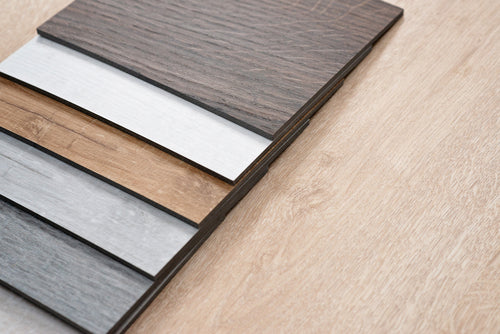
Vinyl vs. Laminate Flooring: Which One Should You Choose?
At Mersey Flooring, we understand the time it takes to choose the perfect floor for your home. However, considering you have narrowed it down to vinyl or laminate, we’re here to help you make the final decision.
Home renovations can be tricky to navigate, but we have made the decision easier for you. Various benefits and factors must be weighed before installing your new floor.
Read on for a comparison guide of our two popular flooring designs.
What is Vinyl Flooring?
Vinyl flooring is a popular and versatile material, used for commercial and residential spaces.
This option is sturdy and durable, ideal for areas with heavy foot traffic and contains a wear layer, print layer, core layer, and scratch layer.
There are several types of vinyl. The most common options include Luxury Vinyl Plank (LVP), Luxury Vinyl Tile (LVT), and Sheet Vinyl.
What is laminate Flooring?
Laminate flooring is a versatile flooring option, used as a cost-effective alternative to hardwood, stone, and tile. This is due to its ability to mimic the look of these natural materials.
Designed with a wear layer, decorative layer, core layer, and backing layer, this is a long-lasting floor for your home.
Popular types of laminate flooring include standard, waterproof, and textured laminate.
Budget Considerations
Typically, laminate flooring is more budget-friendly than vinyl. This is ideal for those looking to cover a wide surface area or decorate multiple rooms.
However, the cost of vinyl and laminate flooring can vary depending on various factors, such as the style, quality, and brand of the material. For example, luxury vinyl flooring is often more expensive than basic laminate options.
Thicker varieties of basic laminate flooring can also be more costly, so it’s best to consider the thickness you need to calculate your budget.
Both floors are relatively cheap for DIY installation. However, professional installation will cost you more, so it's best to add this to your budget as well.
Maintenance and Durability
To clean both flooring, frequent mopping and vacuuming is advised. Avoid using any cleaning products with harsh or abrasive chemicals as this can damage the surface.
Vinyl flooring is often moisture resistant, making it perfect for areas with high moisture levels, such as bathrooms and kitchens. Its impact resistance allows it to withstand heavy objects, preventing denting and chipping.
Laminate flooring is resistant to scratches, stains, and discolouration. Designed to withstand heavy foot traffic, this option is ideal for busy households. Whilst laminate is not waterproof, there are some water-resistant options available.
Aesthetics and Design
Vinyl flooring is available in many styles, colours, and patterns. From tile effect to wood and eclectic designs, there is something for every home and preference.
If you desire the authentic look and character of hardwood flooring, wood-look vinyl planks offer an excellent alternative.
High-quality laminate flooring also involves textured surfaces that mimic the feel of real wood or stone. With a variety of wood, finishes, and patterns to choose from, this looks great with any interior design.
To examine how each floor would complement your home, consider the visual aspects and functionality. If you want a sleek, effective floor for your kitchen, waterproof vinyl is the way to go. However, for a living room or bedroom, wood laminate can provide a cosy and luxurious feel.
Environmental Considerations
Vinyl flooring is not typically recyclable. However, laminate flooring may have some local recycling options available, depending on your location.
Traditional vinyl is made from polyvinyl chloride (PVC), derived from fossil fuels. Due to the release of greenhouse gasses in its production, vinyl tends to be a less eco-friendly option.
Laminate flooring is made from composite wood materials, such as high-density fibreboard (HDF) or particleboard. This is more suitable for environmentally conscious customers.
For a more sustainable choice, look for flooring with certifications from organisations like Greenguard.